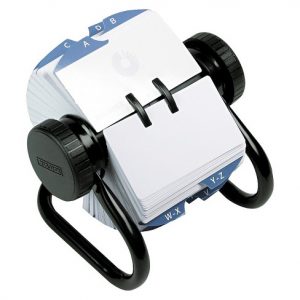For years, people have asked. For years, I just smiled and kind of played along, even though I thought it was a stupid question. They’ll say, “How big is
 your Rolodex?” They’re thinking just because I’m a publicist, and just because I work with journalists every day and help them find experts and stories for their coverage, that I have some magical power of influence. They think just because many journalists are people who I also call my friends, that I get special favors, and my clients automatically get featured. Guess what? It doesn’t work that way! The truth is, I’m only as good as my clients are.
your Rolodex?” They’re thinking just because I’m a publicist, and just because I work with journalists every day and help them find experts and stories for their coverage, that I have some magical power of influence. They think just because many journalists are people who I also call my friends, that I get special favors, and my clients automatically get featured. Guess what? It doesn’t work that way! The truth is, I’m only as good as my clients are.
Here’s a fact you may find surprising: I would rather have the best source in the world and no personal media contacts than have a terrible source and have relationships with thousands of journalists. The reason: A great source or story will always trump a lousy one, no matter who you know.
How do I know? I’ve been in both situations, many times. I’ve worked with numerous phenomenal clients in all different fields over the years. When I turn to my media contacts, the results are usually good. I’m not afraid to admit it, but—especially in my early years, not understanding everything I now understand—I’ve also represented a few people who weren’t at the top of their game. Guess what happened? Sure, we snuck by a few times and got some coverage, but most of the time the results weren’t what I would call a world-class media campaign.
Don’t get me wrong: Media relationships are important. Publicists build them by continually working with the same journalists. These journalists get to know us over time. They may even be more likely to read our emails or take our phone calls because they know we usually have something good to offer them. However, I guarantee you the moment we go to them with a less-than-spectacular story idea, or a source who isn’t exactly the expert he or she is claiming to be, they are going to shoot us down no matter who we are, no matter the friendship and regardless of anything else.
In other words, a publicist’s network is often necessary but rarely sufficient.
Next time you think of asking a publicist how big his Rolodex is, the question should really be: How good is the story I’m pitching, or how strong of an expert am I? A good publicist can certainly help the case for getting you the coverage you want, but you’ve got to give him or her something good to work with from the start. A good publicist also won’t be afraid to tell you if you aren’t doing that, either helping you to improve or refusing to take and waste your money.
Bruce Serbin is an eight-time national award-winning publicist, author and former TV news journalist. www.serbinmedia.com
